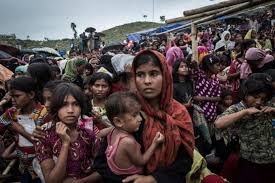SAMI
Published:2020-08-31 22:16:00 BdST
UNGA can force Myanmar to repatriate the Rohingya
The view that the United Nations cannot act without a Security Council resolution to compel Myanmar to take back its displaced Rohingya people from Bangladesh is wrong, precedents suggest.
The world is apparently in a state of near-apathy as regards the statelessness of the Rohingya, created by deliberate policy discrimination and coercive measures by Myanmar authorities over the years.
The UN Security Council proves its inaction to ask Myanmar to stop human rights violation and ensure peace in Myanmar’s Rakhine state, from where more than 740,000 ethnic Rohingya Muslims were uprooted by a brutal military crackdown in 2017. They crossed into Bangladesh and joined over 250,000 of their compatriots in refugee camps.
Despite the gravity of the Rohingya crisis and its ramifications, the UN members are not using the scope of a General Assembly (UNGA) resolution on the basis of the majority of the UN members that, too, did have binding obligation in the past.
In the face of the erstwhile Soviet Union’s veto against the UN intervention into the Korean war, the UN General Assembly adopted the “Uniting for Peace” resolution [377 (V)] with 52-5 votes with two abstentions on November 03, 1950 to use force, as necessary, to maintain or restore international peace and security. Since then, the UNGA has invoked it five times so far to address international crises of the day.
As the UN Security Council may face veto from one or two of the five permanent members while taking a resolution on Myanmar, a recent conference on Rohingya issue insisted that the General Assembly could hold an emergency session following request from any member state.
“Since the Security Council is not in a position to adopt a resolution on the Rohingya issue, the option of the General Assembly’s intervention may be explored,” Kawser Ahmed, an adjunct professor at The University of Winnipeg, Canada, told a virtual conference on “Connecting the Rohingya Diaspora: Highlighting the Global Displacement.”
Currently, more than one million Rohingya people are living in camps in Bangladesh’s Cox’s Bazar district and many others are staying in Southeast and East Asia, the Middle East, Europe and North America. After the Myanmar military had burned the Rohingya villages and committed genocide in 2017, some 600,000 more Rohingya are also kept in virtual detention camps in Myanmar.
Professor Imtiaz Ahmed, director of the Centre for Genocide Studies at Dhaka University, said at the conference, “The Rohingya issue is not merely a bilateral issue between Bangladesh and Myanmar anymore; it has become an international issue. There has been a systematic genocide going on in Myanmar for decades. Even though previously the genocide had not gotten proper coverage, the 2017 events have brought it into the limelight.”
The participants from around the world called on members of the United Nations to support the steps taken by the International Criminal Court and International Court of Justice to ensure justice and accountability for the Rohingya.
While reports and global debates have kept some attention of the international community to the Rohingya issue, there are evidences galore of atrocities including killing, rape and arson committed by the Myanmar military personnel against the Rohingya.
The International Criminal Court (ICC) had in 2019 opened an investigation into Myanmar’s crimes against humanity as evidenced in the forced deportation of the Rohingya to Bangladesh, an ICC member.
In November last year, Gambia filed a petition with the International Court of Justice (ICJ), accusing Myanmar of violating various provisions of the Genocide Convention.
Also, the then-special UN rapporteur on the human rights situation in Myanmar, Yanghee Lee, reportedly concluded in April that “the Tatmadaw’s (Myanmar military’s) conduct against the civilian population of Rakhine and Chin States may amount to war crimes and crimes against humanity.”
In an opinion piece titled “A Strategy for Strong Security Council Action on Myanmar”, Param-Preet Singh of International Justice Programme at Human Rights Watch pointed out that despite the UN Human Rights Council and the UN General Assembly’s “grave concern” about ongoing serious human rights violations in Myanmar, “the Security Council’s silence is deafening, and it comes at a price”.
Dwelling on the well-known polarisation among the five permanent members as a barrier to Security Council action, she referred to the team leader of the UN-commissioned report on the involvement of the UN in Myanmar from 2010-2018, Gert Rosenthal, saying such view ‘ignores the Security Council as a powerful platform to draw attention to the human rights situation in Myanmar, which can morph into threats to international peace and security’.
Unauthorized use or reproduction of The Finance Today content for commercial purposes is strictly prohibited.


